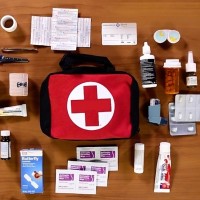Top 10 Life Skills Every College Student Should Learn
So, you're moving off to college? Things are about to change drastically for you. The tasks your parents have been doing for you for years now become your responsibility.Being on your own is both exciting and intimidating. Here are some life skills you'll need to learn to set yourself up for success, not only in college but later in life as well.
If you master these skills, you're ahead of the game.

Time management is probably the most important life skill you need to learn. At first glance, you might think that you have more free time because you only have three classes a day and not back to back like in high school. You have to keep in mind that you need to give yourself more study time and time to eat and add in any time spent dedicated to your team if you're involved in athletics (i.e., practices, workouts, study halls, games, etc.) or other extracurricular activities. You might find your time being booked up faster than flights over the holidays.
This is where a planner or calendar can help you organize your priorities. Google Calendar is an excellent tool for this purpose, in my opinion. Not only keeping track of when and where you need to be throughout the week, but you can also keep track of test days and project deadlines that can easily sneak up on you. Almost every professor will list all the important dates you need to know on the syllabus.

Budgeting is important for anyone, but especially for college students who usually have little money. Successfully budgeting in college will help you achieve financial independence and make smart financial decisions later in life. Here are a few tips:
If possible, try to find a part-time job on campus or in the local community that is related to your field of study, or just something you can work a few hours a week on the side. This is a great idea. Just remember that your academics come first. It's not only a great opportunity to build your resume and interact with people, but also to earn some income for yourself instead of relying on mom and dad to send you money.
Once you start earning money, you should get a bank account and a debit card to manage your money. A credit card is a great way to start establishing your credit score, if you can pay it off every month. I can't emphasize this enough. If you do get a credit card, pay it off in full every month. Otherwise, they will charge you late fees and extra interest on top of that. Be very careful with your credit card. It's a great tool to build credit, which you'll need for buying a car or house, but it can also be dangerous if you're not careful.
A simple way to budget is by starting with your income. Set aside what you'll need for typical expenses in a week, two weeks, or a month (transportation, groceries, fast food, any subscriptions you have). Then, you know how much you're spending and what to cut back on to have some money left over for other things, like going to the movies as an example.
It's also worth looking into the stock market. If you can, try to study up on what stocks to invest in.

Critical thinking is one of the most important skills you'll learn in college. The ability to analyze information and make well-informed decisions will go a long way, not just in school but in life. College courses often require you to dissect complex topics and force you to develop critical thinking skills, which will help you improve your decision-making process for your career and your life in general.

I'm not saying you need to be Gordon Ramsey by any means. You don't have to be able to cook a 5-star gourmet meal, but you should know how to do more than make mac and cheese, ramen, and frozen pizzas. You should learn 2-3 simple recipes at least.
You won't have a full kitchen most likely (unless you're in an apartment), but most residence halls have a communal kitchen area. Dining halls normally have limited hours, so if you miss a meal, you can make your own dinner and have enough leftovers for a few days. If you don't like what they have one day, just don't put metal in the microwave, including aluminum foil or styrofoam. The last thing you want is the whole building to be evacuated because you set off the fire alarm by accident! Plus, being able to cook is a beneficial skill to have as you get older.

Your dorm is a tiny space, and it's easy to get it messy, especially if you leave it unattended for a long period of time. Your mom isn't there to clean up after you anymore. It's time you learn how to tidy up your living space, not just for your sake but your roommate will thank you as well, and it'll save you from potential disagreements.
Some simple things you should know include washing dishes, making your bed, changing the sheets on your bed, vacuuming, taking out the trash, organizing your clothes, doing laundry, and cleaning your bathroom. These are things you'll be expected to do in the future anyway, regardless if you're living in a house or an apartment. It's so much nicer walking into a clean room than a dirty, unorganized mess.

College is the best time to start building your professional connections. You're likely to meet professors, mentors, alumni, and even your colleagues can be valuable assets to your personal network. Take advantage and get to know as many people as you can. Sometimes, to advance in the field, it's all about who you know. These people can provide advice, connections, and potential letters of recommendation for you!
Go to the career fairs when they are available! Embrace networking opportunities and put yourself out there. Chances are high if you get their email address and follow up with them, they will be more than happy to assist you! It's amazing what could happen when you find a connection. These people can truly help boost and elevate your career path. Also, create a LinkedIn profile! It's also a very useful resource for networking.

At home, you were probably eating healthier, with a school meal in high school and a home-cooked meal at dinner time. You at least had a more structured diet. In college, that's all thrown out the window. Your mom's home-cooked meals aren't an option. The cafeterias are normally buffet style, where you can eat as much as you want and whatever you want.
Also, it's going to be really tempting to eat McDonald's and Taco Bell every day because it's easy. Here's the thing: the "freshman 15" is very real, even if you think there's no chance it happens to me. I know it's hard to control yourself without your parents being there to tell you to eat your fruits and veggies. Those chicken nuggets and French fries are so appealing and cheap! Just don't make it a bad habit. It's easy to fall into, especially when it's late at night and you're hungry, and the cafeteria and food options on campus are closed.
My advice: one plate at the cafeteria, don't get more than you can eat in one sitting, have some healthy snack options in your dorm room, and try to eat at least one fruit and one vegetable per meal.

I'm not saying you need to be a licensed doctor or anything, but at some point, you probably will feel under the weather. It's important to know what medication to take to feel better. Always a good idea to have some ibuprofen, Tylenol, and basic allergy medicine handy, as well as any personal prescription medications. Any prescriptions you should send to the local pharmacy in town.
Also, if you play a sport or something, injuries are unfortunately not uncommon. You should at least have some bandages, maybe a small roll of athletic tape handy, to treat your basic cuts. Anything more severe than a minor cut, you should see the athletic trainer immediately. There's also usually online doctors or other campus health services provided. It's important to know when to go see a doctor, and if you are truly ill, as in vomiting, don't go to class.
In high school, your parents probably were the ones who emailed the school, set up your appointments, and took care of whatever you needed. Now, it's on you to advocate for yourself. You need to learn how to ask for help yourself. Talk to professors during office hours if you need. Most colleges have free resources available for you to use.
If you have a problem with your roommate, talk to them first. For other issues in your residence hall, talk to your RA or maintenance. Everyone is there to help you! Just know how to ask for assistance when you need it. Your parents can't be the ones doing all the talking anymore. Almost everyone working on campus is happy to help you if you just ask for it. By the time you graduate college, you should have no problem calling the doctor's office to schedule an appointment.

This one may not be applicable to everybody, but if you do have a car, you should know how to do basic maintenance like checking the oil level and other fluids in your vehicle, and checking tire pressure. Other additional things you should know how to do include jump-starting a dead battery, changing a flat tire, changing the oil in your car, and how to talk to a mechanic.
All of these things may not be everyday skills you'll need, but trust me, it's not uncommon to have car problems, and it is so much more helpful and reassuring if you have some idea of what to do, especially if you're stranded on the highway in the middle of nowhere. If nothing else, a roadside emergency toolkit is worth investing in. Just in case, it's always better to be prepared.
